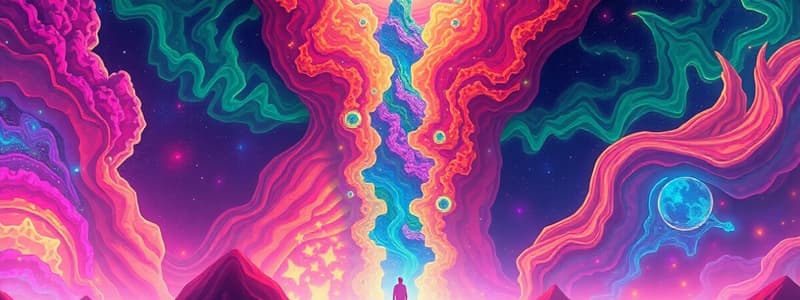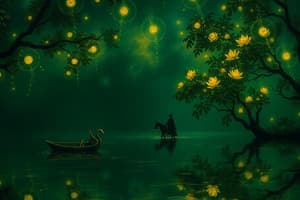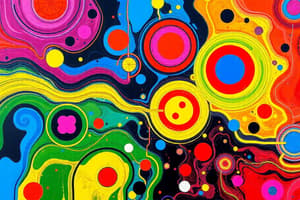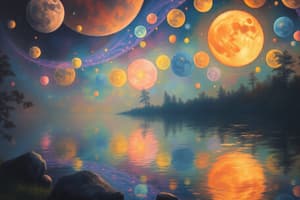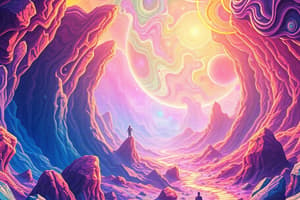Podcast
Questions and Answers
Hallucinogens are primarily known for their ability to alter perception.
Hallucinogens are primarily known for their ability to alter perception.
True (A)
LSD was first synthesized by Albert Hofmann in 1948.
LSD was first synthesized by Albert Hofmann in 1948.
False (B)
Hallucinogens can cause addiction to the drug itself.
Hallucinogens can cause addiction to the drug itself.
False (B)
Natural compounds such as mescaline and psilocybin are examples of hallucinogens.
Natural compounds such as mescaline and psilocybin are examples of hallucinogens.
Hallucinogens can only be ingested through swallowing pills.
Hallucinogens can only be ingested through swallowing pills.
Psychedelics are a subclass of hallucinogens that increase emotional openness.
Psychedelics are a subclass of hallucinogens that increase emotional openness.
Dissociatives are considered a subclass of hallucinogens.
Dissociatives are considered a subclass of hallucinogens.
Hallucinogens have never been used for medicinal or religious purposes.
Hallucinogens have never been used for medicinal or religious purposes.
The physiological effects of hallucinogens include visual distortion and hallucinations.
The physiological effects of hallucinogens include visual distortion and hallucinations.
Amphetamines are categorized under hallucinogens.
Amphetamines are categorized under hallucinogens.
Hallucinogens only refer to drugs that cause physical dependence.
Hallucinogens only refer to drugs that cause physical dependence.
Natural compounds such as mescaline and psilocybin originate from various plants and fungi.
Natural compounds such as mescaline and psilocybin originate from various plants and fungi.
Entactogens are known to provide experiences of emotional connection and empathy.
Entactogens are known to provide experiences of emotional connection and empathy.
The primary usage of hallucinogens is limited to recreational purposes.
The primary usage of hallucinogens is limited to recreational purposes.
Psychedelic hallucinogens can enhance the sensory experiences without filtering out any information.
Psychedelic hallucinogens can enhance the sensory experiences without filtering out any information.
Hallucinogens are typically injected for consumption.
Hallucinogens are typically injected for consumption.
The use of hallucinogens for therapeutic purposes was common even in ancient times.
The use of hallucinogens for therapeutic purposes was common even in ancient times.
Marijuana is classified under hallucinogens.
Marijuana is classified under hallucinogens.
Flashcards
Hallucinogens
Hallucinogens
Drugs that alter perception, causing hallucinations and visual distortions.
LSD
LSD
A synthetic hallucinogen, first synthesized in 1938.
Psychedelic Hallucinogens
Psychedelic Hallucinogens
Hallucinogens that remove the brain's filtering process, causing heightened sensory experiences.
Entactogens
Entactogens
Signup and view all the flashcards
Ketamine
Ketamine
Signup and view all the flashcards
PCP
PCP
Signup and view all the flashcards
Marijuana
Marijuana
Signup and view all the flashcards
Mescaline
Mescaline
Signup and view all the flashcards
Psilocybin
Psilocybin
Signup and view all the flashcards
Addiction vs. Hallucinogen effects
Addiction vs. Hallucinogen effects
Signup and view all the flashcards
What do hallucinogens affect?
What do hallucinogens affect?
Signup and view all the flashcards
Addiction and hallucinogens
Addiction and hallucinogens
Signup and view all the flashcards
Types of hallucinogens
Types of hallucinogens
Signup and view all the flashcards
Dissociative hallucinogens
Dissociative hallucinogens
Signup and view all the flashcards
Atypical Hallucinogens
Atypical Hallucinogens
Signup and view all the flashcards
Examples of Hallucinogens
Examples of Hallucinogens
Signup and view all the flashcards
How are hallucinogens taken?
How are hallucinogens taken?
Signup and view all the flashcards
Study Notes
Hallucinogens
- Hallucinogens, also known as psychedelic drugs, alter perception, including senses, thoughts, and feelings.
- They induce vivid imagery or hallucinations and visual distortions
- Hallucinogens do not cause addiction, but users can become addicted to the effects.
- Examples include LSD, Ketamine, PCP, Marijuana, mescaline (from peyote cactus), psilocybin (from certain mushrooms), and anticholinergics (from jimson weed).
Types of Psychoactive Drugs
- Hallucinogens
- Stimulants
- Depressants
- Opiates & Opioids
Lecture Objectives
- Define hallucinogens and provide examples.
- Explain different classes of hallucinogens.
- Describe the physiological effects of hallucinogens.
Subclasses of Hallucinogens
- Psychedelics
- Entactogens
- Dissociatives
- Atypical
Psychedelics
- Under normal conditions, the brain processes information by filtering out certain aspects of the environment.
- Psychedelic hallucinogens eliminate this filter, allowing users to experience their surroundings intensely.
- Common effects include an overwhelming sense of expansion, where colors, sounds, smells and textures seem amplified.
- Users may experience vivid visions and voices.
Entactogens
- Produce experiences of emotional connection, oneness, relatedness, and heightened empathy.
- These experiences are often described as consistently evoked.
- Show potential therapeutic benefits in post-traumatic stress disorder and anxiety.
Dissociatives
- The brain's ability to process sensory environment is diminished by dissociative hallucinogens.
- Users report a sense of detachment from their surroundings.
- Dissociative experiences may affect user perceptions of body and environment.
- Effects can vary by dosage and drug type and some users report "out-of-body experiences" or a trance-like state.
Atypical hallucinogens
- A diverse group of substances with various mechanisms of action, legal statuses, and therapeutic potentials.
- Examples: Ibogaine (schedule I, US) acts as a serotonin 2A agonist, and antagonist to other receptors; Salvinorin A; THC (the primary psychoactive compound in cannabis)
Harmful Effects of Hallucinogens
- Physical effects: Flashbacks; increased energy and heart rate, nausea
- Emotional effects: Mood swings; panic attacks; loss of senses; depression
Mixing Hallucinogens with Other Drugs
- Mixing hallucinogens and stimulants can cause extreme stress to the body.
- Mixing hallucinogens and alcohol may result in reduced coordination and vomiting.
History of Hallucinogens
- Albert Hofmann synthesized LSD in 1938.
- Hallucinogens have been used by humans for a very long time, both for medicinal and spiritual purposes.
- Some cultures believed these substances allowed closer connection with their deities.
Studying That Suits You
Use AI to generate personalized quizzes and flashcards to suit your learning preferences.
